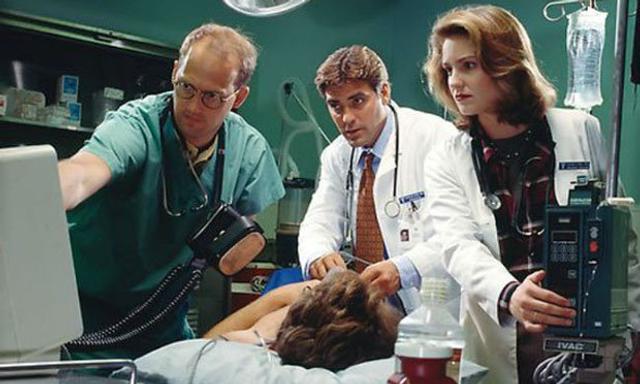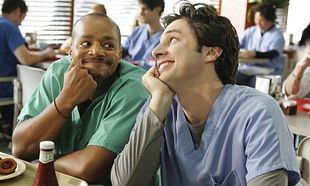It's surprising, given the easy access to knowledge people have nowadays, that many still believe the common myths about medicine that are presented on television.
From mild ailments to life threatening conditions, there are a lot of misconceptions about medicine that people hold as gospel because they saw it in their favourite sitcom or medical drama over twenty years ago.
And why wouldn't you believe what you see on TV? Surely the writers of all of these medical shows want to be as accurate as possible, right? Well, of course they do. However their primary concern is to create drama and sometimes that means taking liberties with the facts.
To that end, we've compiled a list of six of the most common misconceptions people have about medicine and hospitals thanks to what they saw on TV.
1. Defibrillators aren't used on flatlining patients

You've seen it in literally every medical drama ever. A patient is flatlining on the operating table and the surgeons use the defibrillator to bring them back from the clutches of death. It's exciting and creates real tension as the audience waits with bated breath to see if it will work (it almost always does). It's also complete nonsense.
Shocking the heart when a patient is flatlining almost never works. Defibrillators DO send a shock to the heart but they're only really used to correct an erratic heartbeat, not jumpstart the whole thing back into action. CPR has a far greater success rate for getting a heart beating again, though even that has a low success rate.
Also, real life doctors don't rub the paddles together before using them. That can damage the equipment and is just plain stupid.
2. Don't tilt your head back if you have a nose bleed

It makes sense right? If the blood is coming out of your nose, just tilt your head back and it will stop flowing out? Well yes it WILL stop flowing out of your nostrils but that blood has to go somewhere, and that somewhere can easily be your throat if your head is tilted back. There's a (slight) risk you could choke on said blood or at the very least you might start to feel nauseous.
The best way to deal with a bloody nose is to lean your head forward and pinch the soft part of your nose beneath the bridge until the bleeding stops.
3. Don't pull out that knife you've just been stabbed with
This one has cropped up in a whole host of action movies where the tough guy hero, after disposing of multiple henchman, notices something sharp lodged in his leg and decides to pull it out and toss it away.
Yeah, don't do that. That's just silly because if you've been stabbed and you're somehow still alive then that knife is probably one the main things keeping you alive.
You see, the knife acts as a seal. Keeping the blood in your body. If it were to be removed without the proper expert care, what's stopping all of that blood from pumping out? There's also a risk of you severing a vein, artery or something else important as you pull it out. So, you know, maybe consult a doctor before pulling it out?
While we're here, let's just remember and laugh at that time Jack Bauer pulled out the knife he'd been stabbed with and used it to go on a killing spree.
4. The same Doctor doesn't do everything
.jpg)
If Hugh Laurie's House has anything to answer for, it's the idea that doctors are the best multi-taskers on the planet. OK most of them probably are very good at multi-tasking but they certainly aren't able to operate the MRI machine, run your blood work in the lab AND perform complex surgeries all by themselves. The HSÉ could only dream of such people.
Your treatment is not carried out by one person. There is a whole team of nurses, radiologists, anaesthetists, lab technicians and surgeons (that's literally just the tip of the iceberg by the way) that can be involved in saving your life.
5. Peeing on jellyfish stings won't ease the pain

The writers of Friends have a lot to answer for. This isn't a myth from medical television shows per se but we still think it's worth knowing before you get your friend to urinate on you and the two of you are unable to make eye contact ever again.
It almost falls into the category of being so ridiculous it must be true but in reality, urinating on a jellyfish sting won't ease your pain. It will just make your sting smell like urine.
If you want some actual relief from a jellyfish sting, try pouring vinegar on it. The acid should help neutralize the sting. If you don't have any vinegar handy then seawater can be almost as effective.
6. You shouldn't administer a drug straight into the heart
The scene from Pulp Fiction is the one that immediately comes to mind here but we would be shocked if that hasn't been repeated in at least one medical drama in the years proceeding Tarantino's 1994 classic.
Intra-cardiac injections are a real thing but they're a far more dangerous method than administering the drug through a vein. Yes you're sending the drug straight to the heart but there's also the risk that you might leave a hole in said heart with the syringe. This can cause someone to bleed to death.
Considering your blood circulates throughout your entire body in less than a minute, administering the drug through a vein is more than effective enough. It might not be as sexy, but it's certainly safer.










































































